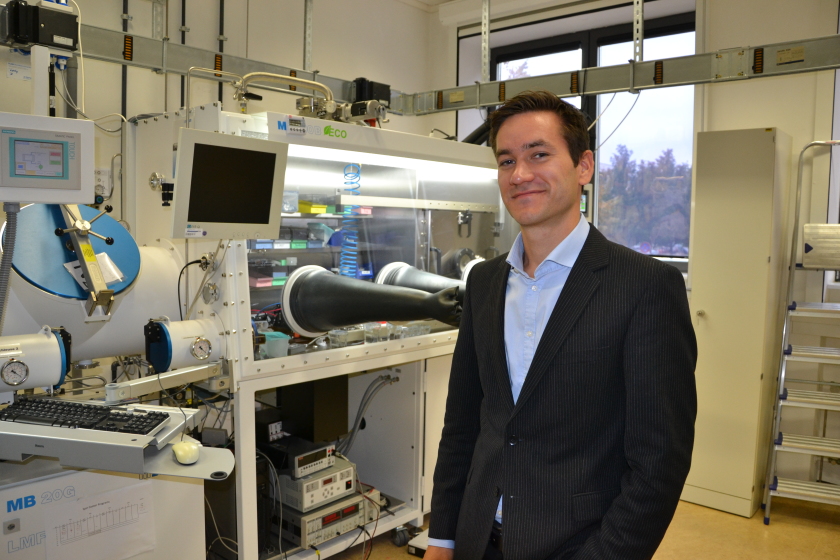Steve Albrecht is Junior Professor at the Technical University of Berlin

Steve Albrecht is heading the junior investigator group "Perovskit Tandem Solar Cells" at the HZB. © A. Kubatzki/HZB
The Technische Universität Berlin (TU) and the Helmholtz-Zentrum Berlin (HZB) have appointed Prof. Dr. Steve Albrecht to the joint junior professorship "perovskite solar cells" as of December 15, 2018. Since 2016, Albrecht has headed the junior investigator group "Perovskit Tandem Solar Cells" at the HZB, which is funded by the Federal Ministry of Education and Research.
With his team of 11, Albrecht researches and develops tandem solar cells that combine the advantages of silicon and perovskite solar cells. If both materials are combined to tandem solar cells, a larger part of the light spectrum can be converted. This increases efficiency. The junior research group recently succeeded in increasing the efficiency of perovskite silicon tandem solar cells to 25.5 percent.
Steve Albrecht will also take on teaching responsibilities at the TU Berlin as part of his junior professorship, including supervising a perovskite internship for students at the HZB.
Albrecht studied and completed his PhD in physics at the University of Potsdam. For his dissertation on organic solar cells he was awarded the Carl Ramsauer Prize of the German Physical Society and the Young Investigators Prize of the Leibniz-Kolleg Potsdam.
At the end of 2014, Albrecht joined the HZB as a postdoctoral researcher and established the research field perovskite solar cells at the center. In 2017, together with Eva Unger, he was in charge of setting up the infrastructure for the HySPRINT Perwoskit Laboratory at the HZB. Today, 40 users work here, producing and characterizing perovskite layers for solar cells using various techniques and methods.
(sz)
https://www.helmholtz-berlin.de/pubbin/news_seite?nid=20260;sprache=en
- Copy link
-
Battery research with the HZB X-ray microscope
New cathode materials are being developed to further increase the capacity of lithium batteries. Multilayer lithium-rich transition metal oxides (LRTMOs) offer particularly high energy density. However, their capacity decreases with each charging cycle due to structural and chemical changes. Using X-ray methods at BESSY II, teams from several Chinese research institutions have now investigated these changes for the first time with highest precision: at the unique X-ray microscope, they were able to observe morphological and structural developments on the nanometre scale and also clarify chemical changes.
-
Martin Keller elected new president of the Helmholtz Association
The Helmholtz Association has appointed internationally respected US-based scientist Martin Keller as its new president. Her has lived in the United States for nearly three decades, during which he has held various scientific leadership roles at prominent institutions. Since 2015, Keller has directed the National Renewable Energy Laboratory (NREL) in Golden, Colorado. His term begins on 1.11. 2025.
-
Rutger Schlatmann re-elected as ETIP PV Chair
The European Technology and Innovation Platform for Photovoltaics (ETIP PV) was created by the European Commission in order to promote photovoltaic technologies and industries in Europe. Now, the ETIP PV Steering Committee elected a new Chair, as well as two Vice-Chairs for the term 2024 – 2026. Rutger Schlatmann, head of the division Solar Energy at the HZB, and professor at HTW Berlin, was re-elected as the ETIP PV Chair.
